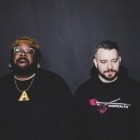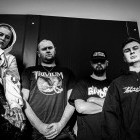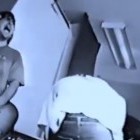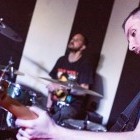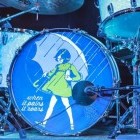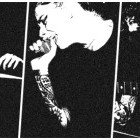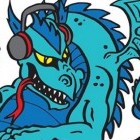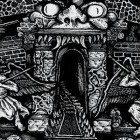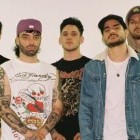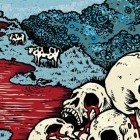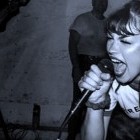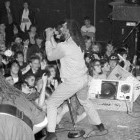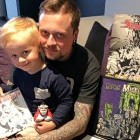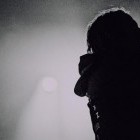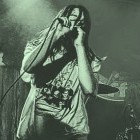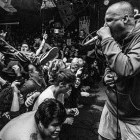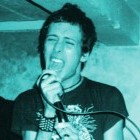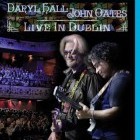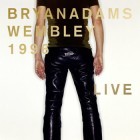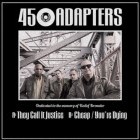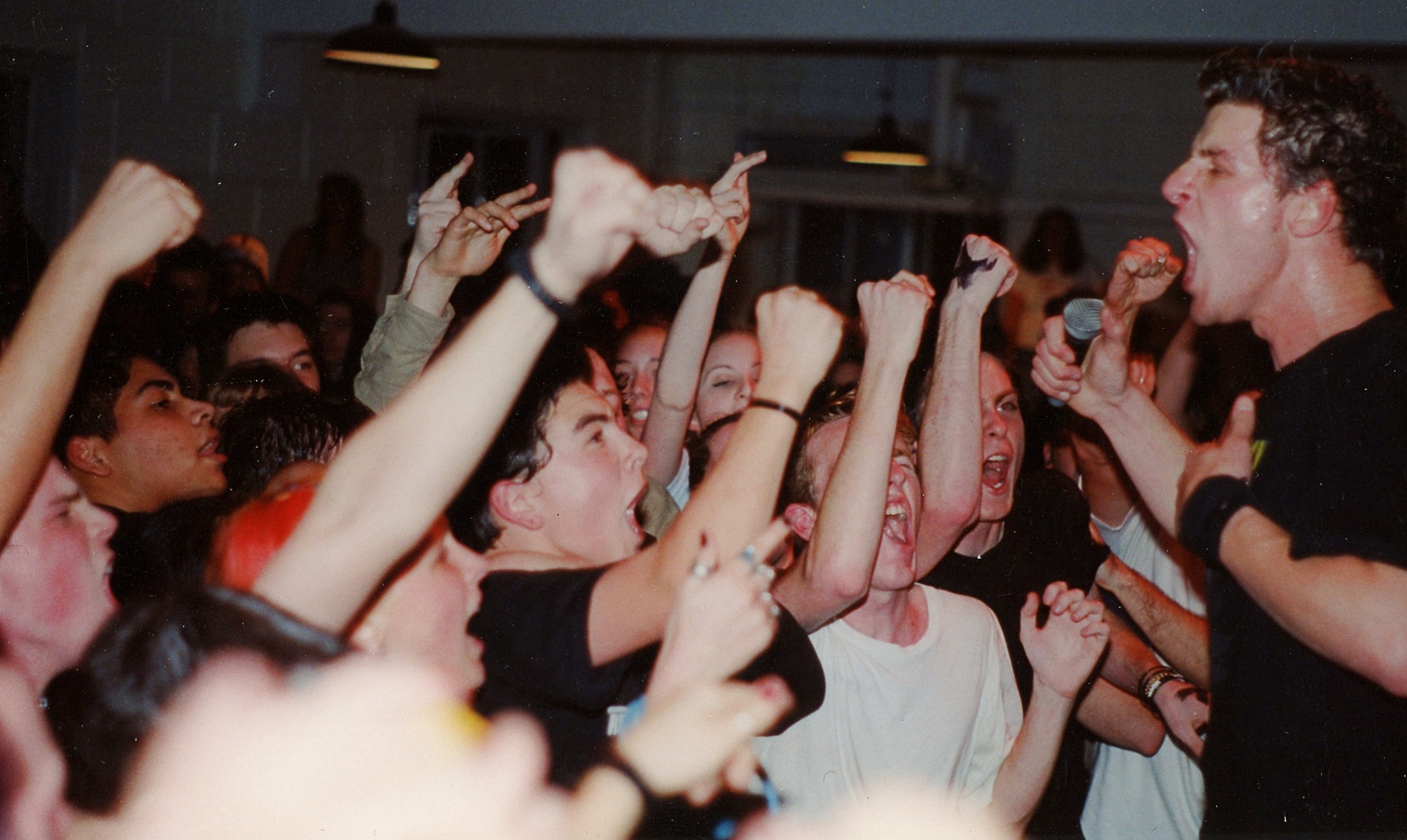
I booked my first show February 20, 2000. I had just turned 19 and was going through my one failed year at UC Santa Cruz. I had absolutely no idea what I was doing. There was a little help from some of the local kids, but my overhead was over $1200 to not lose money. Death By Stereo bailed last minute and I was scared. The Nerve Agents played, and the mic cord broke on the first song, so there were no vocals. A lot more kids showed up than I anticipated and we did pretty well. I tried to pay Eric Ozenne from The Nerve Agents and he refused. The vocalist said "pay the bands who came from a long way and keep the rest for yourself cause you worked hard."
A few months later, I booked the Nerve Agents to play at the same place with Kill Your Idols and Eric said the same thing again: pay the touring bands and keep the rest for yourself. I would continue to see the Nerve Agents over and over back then, and working at Revelation Records, I got to be at their record label, continuing to keep contact with the band, and making new shirt designs (ahem).
I was really excited to do this comprehensive interview with Eric Ozenne discussing his life in punk. It's an honor to be able to have conversations with people I respect as much as I do Eric.
Where did you grow up and what was your first exposure/experience with punk?
I grew up in the East Bay of the San Francisco Bay Area. I was a valley kid. When I first got into skateboarding in middle school, I was already pretty screwed up and angry due to my home life and was fully rebelling against it from the age of 12. I had been trying on various subversive personas through those years as response to a home life and world I was starting to view as ‘not okay’ and unacceptable. I was very into the whole '80s new wave/goth trend that was happening at the time, feeling more comfortable among the weirder kids and the troublemakers. The skaters, where I was from, pretty much were the punks in those days and there were not a lot of punks anyway.
In 1982, when I was 12, I got my very first two cassettes, which were A Flock of Seagulls and the Clash's Combat Rock. I was listening to elements of punk and then got hit with the Sex Pistols, 7 Seconds, Christ on Parade, Circle Jerks, and Social Distortion through a couple early mix tapes in the summer of 1985. I immediately started going to shows that year with some of the junior and senior punks from my high school. We would all jump into someones car and drive to the city to see shows at the Farm, the Mabuhay Gardens, the Rock on Broadway, and the Stone, all venues in San Francisco in 1985. This was pretty much the time where I really started to understand what I was experiencing as punk and as emotionally raw as I was, it all fit pretty well.

What was your first show?
My first show was No Comment opening for Caroliner Rainbow in an old church in Berkeley, a very half-assed affair. My first punk show at an actual venue was at the Farm in SF, seeing Christ on Parade, the Not, Descendants, 7 Seconds, and Circle Jerks. It was a hell of an indoctrination into the SF punk scene.
Wait, that was one show?
Yes. Pretty amazing, right?
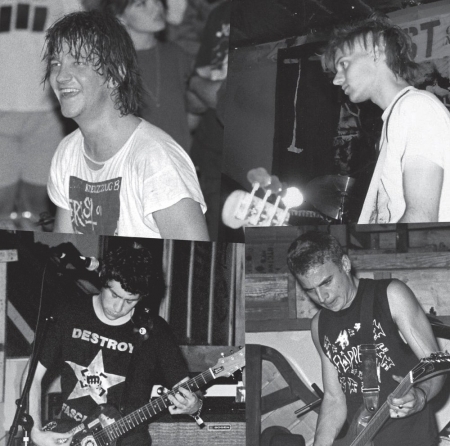
It makes my head spin. I don’t want to be one of those “good old days” types but damn! So, you start going to shows in 1985 and Unit Pride starts during that period. How did Unit Pride come about and what were the influences there?
[Laughs] Yes, shows in 1985. Unit Pride starts as Misled Children in 1986 with Tim Monroe, Grant McIntyre, Peter Tisa, and Jeff, who ultimately didn’t stay with us past a few months. The name "Unit Pride" came from a book about Vietnam that Pete had. One of our first, very infamous songs was “Fuck the Flag,” essentially about not putting our lives on the line for a flag that represented a country we found as so screwed up. As a 15-year-old, the thoughts around the song was not quite so formed, but that was the gist of it [laughs]. It was all about Reagan’s White House back then. We hadn’t all converted to East Coast hardcore yet, that would be in 1987.
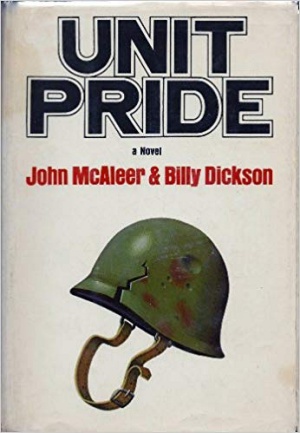
Take us through that conversion.
So, Tim Unit Pride's guitar player, was into hardcore pretty much before the rest of us. Pete was into some hardcore, but mainly Tim brought into our consciousness more 7 Seconds and Youth of Today's Can’t Close My Eyes. He had given me a cassette with those bands on it a week before we went to Gilman St. in August 1987 to see the band on the tape he gave me: Youth of Today. Gilman St. had just opened earlier that year and Unit Pride's first venue show at Gilman St. opening the bill that B’last! was headlining.
So, I had been really into B’last!, but they werent Youth of Today. When I saw Youth of Today on that Break Down the Walls tour, I was an instant convert. I immediately became straight edge and I thought Ray Cappo was almost like a messiah.
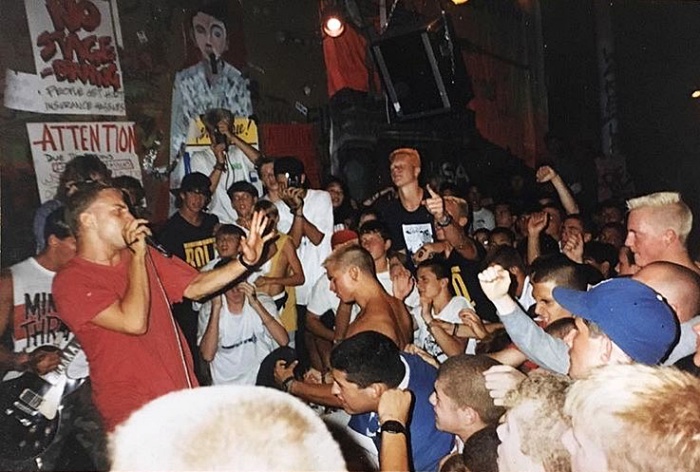
Here I had been for a couple years now, toying with listening to bands like the Exploited and D.R.I., bands who maybe sounded great but were not speaking to me. It was like Morrissey would say, their lyrics...”said nothing to me about my life.” Now, here was someone who was screaming all sorts of positive lyrics about change and acceptance, standing up, using your voice, taking a positive path versus a negative one and he was externally expressing such an intensity and rage that I personally felt, it all just made sense, suddenly. I had said at that point, in that show, that I would never play any less intense or with any less passion than what I saw Ray doing.
During that show, I met Walter Schriefels and he and I spent much of that show talking and just became friends. He invited me to stay at his house if I was ever in New York. I actually lied to him and told him that I had been planning on possibly coming in the Fall. He was 19 at the time and I think he assumed I was older because I have always been pretty tall, but I was just 16. Youth of Today stuck around for the next week and played a Gilman St. set unannounced the next weekend and we spent more time with them. I then hatched this whole plan to spare change, borrow money, and forge one of my mom's checks to get a plane ticket to New York. Thats what I did. I stayed in touch with Walter and ended up in New York City in November 1987. I had a round trip ticket coming back two weeks later, but in my head, I was running away from home and had a hope I could find a way to live there [laughs]. I was so young.
Walter and his family were such great hosts. That trip I hung out with the Gorilla Biscuits guys, Gus Straight Edge [Peña], Youth of Today, I met Matt from Bold, Jules from Side By Side, John Joseph served Ray Cappo and I in some krishna restaurant on the Lower East Side. I met Jordan Cooper who had recently started Revelation Records with Ray Cappo. I got to go to a Youth of Today practice and sang backups on some song that never saw the light of day...the chorus was “a...blind...patriot.” Not sure what it was about. The practice was in Don Fury's studio. I also got to go to Some Records and came back from NY with all of this amazing music and an experience that was so profound for me as a 16-year-old, that I really feel like it set in motion my entire musical trajectory.
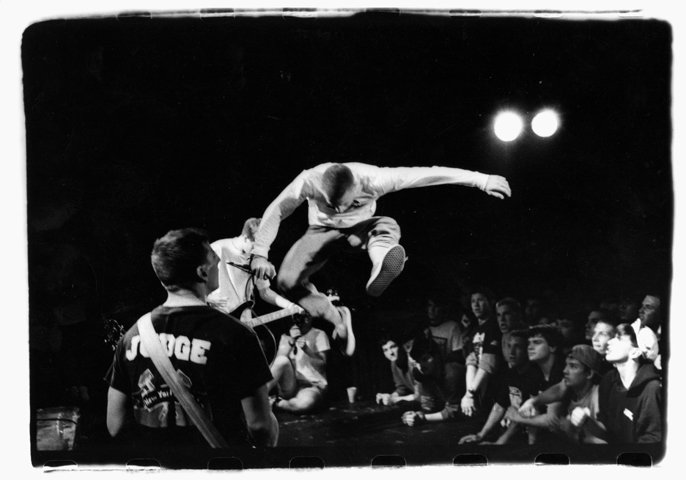
It was on after that. Unit Pride then became set down the path influenced by NYC hardcore. We ended up doing a demo around that time recorded at Gilman St. and it’s on the Mankind Records Unit Pride release. Our lone 7”, basically our actual only release other than the two demos, came right after the NYC trip. It was a really incredible time. I finally felt like I was being true to who I was balancing the intensity of the music with optimistic/positive lyrics.
That's an incredible story! This is in 1988?
This was 1987. The Unit Pride EP was recorded and released in 1988. After Youth of Today came on tour again that year, Ray Cappo, when they toured through Arizona, now had our 1987 demo and told the guy in Arizona who did Step Forward Records about us. That guy called me and basically said, "Ray says your awesome, want to do a record?" He had never heard us but went on Ray's word and essentially paid for and put out 1000 pressings of our first EP. It was a total leap of faith. Pretty amazing! No YouTube, no Bandcamp, no anything, just “You should put out this bands record” and “um okay.” I can’t even remember if we ever met him in person? 1988, we were playing nearly all of the hardcore shows coming through Gilman St. We met a lot of great people and bands that year. No For An Answer, Hard Stance, Insted, and the Bold guys came through along with Youth of Today. It was pretty fun year and Jordan seemed to have all of these amazing Revelation Records releases churning out at that time, so Unit Pride was fortunate enough to be around during that time.
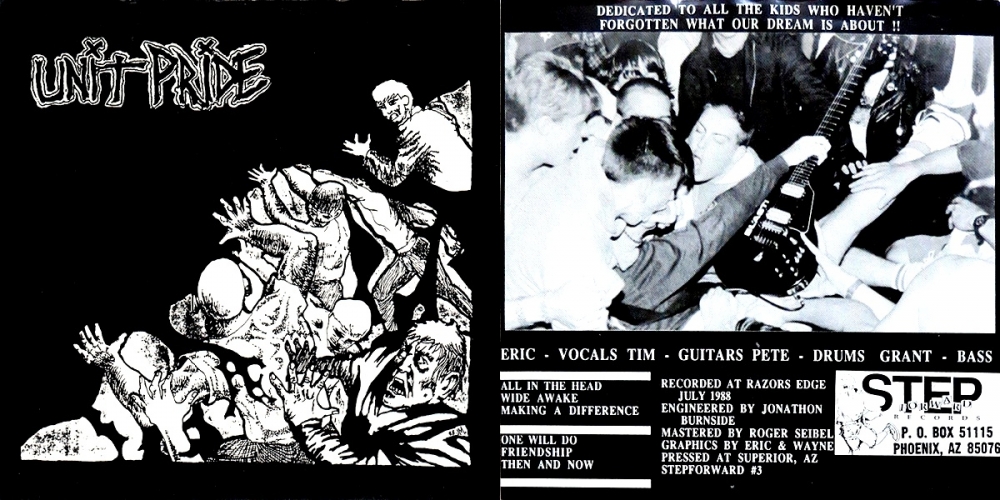
The other thing that was happening for Unit Pride was that Tim Armstrong and the guys from Operation Ivy were fans of our band and we seemed to find our way onto a large number of Op Ivy shows from 1987-1989. We had some incredible experiences as we were Valley kids skirting the Berkeley Gilman St scene. We were this odd element of straight edge (and some not so-straight edge) hardcore Valley kids that existed amongst this scene of people who were responding in opposition to the violence that had a stranglehold on the American hardcore scene. Strangely, we were doing the same thing with our uber positive messages, but the seriousness, intensity, and rage coming out of our style of music, along with the very sporty fashion of straight edge hardcore, really through the Gilman St. scene.
People had a hard time accepting us, we were such a weird foreign element, that looked like and sounded like what many of them were rebelling against. Gilman St. Warehouse has the most incredible core values. We would have been nothing without that place and Tim Yohannan believing in us or the Op Ivy guys; Tim Armstrong and Matt Freeman. We were pretty lucky. Did you see the Turn It Around documentary about the east bay scene and the creation of Gilman St.? It's a really well done documentary. I would encourage anyone to check it out.
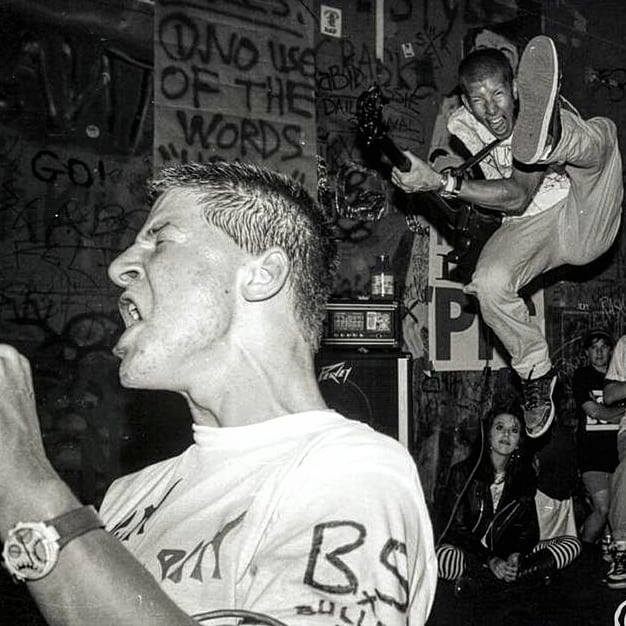
No, I did not but I heard good things. I’ve played there and been there enough to really feel the history. Unit Pride wasn’t that long lasting of a band, though. Between that and Redemption 87 in the mid-'90s, what were you up to?
In 1989, I was really struggling with who I was and what I had been doing with my life. I wasnt really happy with the exclusive feel that was coming out of the straight edge movement, so, of course, I turned away from that. At the same time, I had spent years essentially failing high school and now I had realized that I wasn’t going to graduate. It was a pretty eye-opening time for me. I ended up quitting Unit Pride as a summer East Coast tour was being planned. That pissed everyone off. I told them to have Kori Sabbatini sing in my place, since he was our roadie. They did.
I ended up doing a 5th year of high school to graduate in 1989-1990, shunned all of my friends who I felt were a distraction and moved into this really weird place in my life where I was trying to be something I wasn’t. Really, I was trying not to become my parents, who I saw as a mess... drugs, alcohol, violent home life; fuck that! Madonna used to say “My drive in life is from this horrible fear of being mediocre.” I took that as a relatable statement and worked very hard to become more than who I saw my family as, which was mediocre, my mom languishing in a hellish suburban nightmare and my dad too addicted to find his way back to connection with his kids. I love them, but I spent my days working to be better than that. Unfortunately, i had no discipline to hold down a job or save money. What does a rebellious kid do when he has no discipline to work his way out or pay his way out of his gnarly home life? Fuck it, join the Marine Corps! [Laughs] I served three years in the infantry from 1991-1994.
Here’s what I learned; it was not a good match for me and that it was one of the best moves I could have made to benefit my life for years to come and there’s a whole subset of punks in the military. There were like six of us within two different companies who collectively came together most nights and listened to things like Gorilla Biscuits, Rancid’s first album, Screw 32 demo, Black Flag. When we were all on deployment in 1993, we would hole up in this abandoned barracks that had, like I don’t know, hundreds of fans in a giant pile. I had been reading Diet For A New America by John Robbins and Animal Liberation by Peter Singer, so I had floated these books among my punk Marine buddies and we all decided to go Vegan, in fucking Japan, where you cannot read ingredients on the labels [laughs]. So, we bought a hotplate and would illegally cook in this abandoned barracks, listen to punk and hardcore all night, moshing each other and throwing fans at each other. It was an amazing time. We calked ourselves the Fan Club. I got out in Spring of 1994 and returned to the East Bay.

And I assume your experience in the military had some influence on the name the Nerve Agents and art on the first EP?
Yeah, I went through chemical warfare training and I had remembered how frightening nerve agents had sounded. There have been some actual nerve agent attacks in the news and what happened to the people attacked was gruesome. When we came up with that name we were interested in our band being more influenced by punk and hardcore, rather than what myself in Redemption 87 and the Model American guys had just come out of which was more solely hardcore influenced. The name was purposely to break in a different direction, almost psychologically. The art was this image we found on the internet that went so perfectly with the Nerve Agents theme. We contacted a guy in Kansas and he sold us that image.
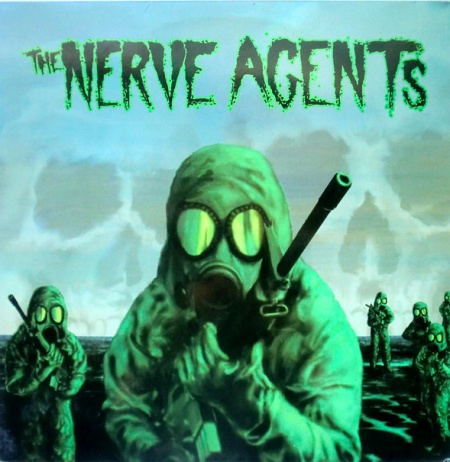
But the name and imagery is pretty heavy. A lot of Americans probably aren’t aware of how gnarly chemical weapons are. While not a nerve agent, my dad got Agent Orange poisoning in Vietnam and has had cancer four times in my life. (Note: my dad is still alive at 75, has survived cancer multiple times and still loves ice cream, baseball, and Maker’s Mark Manhattans) These things linger in people’s bodies and can take decades for physical ailments to arise.
Yes, it was meant to be heavy and kind of scary, for anyone who would slow down and think about it. Thats what the point of the song "Level 4 Outbreak" was all about, to throw this idea that these things exist, maybe not within the comforts of luxurious America, but they could...and are you fucking ready?
I am sorry to hear about your dad having to continually battle the effects of Agent Orange. I am a social worker, who has been working at the VA for the past five years. I run into a lot of folks who struggle with issues related to Agent Orange. The chemical warfare that’s been used in conflicts since their initial development is crossing a line in my opinion. America used Agent Orange, dumping it on Vietnamese fighters and civilians, to me that’s no different than Hiroshima or Nagasaki. Even when I was in the Marine Corps, I was not pro-war. I wanted nothing to do with killing anyone. I believe in communication and diplomatic solutions. Once you roll out military conflict in any disagreement, the likelihood for things to go horribly wrong is so high and what comes with that, that no one generally thinks about is the long term consequences of death, destruction, trauma, distrust, and overall suffering. We have to be better than that. We can be.
So, you return to the Bay Area and it doesn’t take long to hook up with some heavy dudes to form Redemption 87.
Right, I had come back into the East Bay in 1994 and Green Day had just blown up and Rancid was on their rise and things were really fun. I was living on Andrew Atai’s couch at a house on the Oakland/Berkeley border that Tim and Bret from Rancid lived at, Scott from the Dance Hall Crashers, and Sara who worked at Thrasher magazine. That house was like a central hub for all kinds of people locally and on tour. I just happened to live in the living room that Spring and Summer, so I met a ton of cool people. This is where I met Lars from Rancid and after he and I talked about me starting an old-school hardcore band, he introduced me to Timmy Chunks, formerly of Token Entry. I had seen Token Entry on Long Island at the Right Track Inn with Walter Schriefels in 1987, so I was intimidated by Timmy at first, but he quickly turned out to be way cool. Lars knew Ian Miller who played bass and was in Skankin’ Pickle and a Unit Pride fan from his youth, he introduced us.
I knew Gary Gutfeld who played for the SF indie band Corduroy but was an old punk who grew up in the '70s. All those guys were totally down to do a hardcore band. Lars eventually came up with the name for us Redemption 87, since we were targeting an East Coast style of hardcore that was being heavily played that year. The style of hardcore had changed so much since that time, that we really looked to get it back to a pretty simple approach. Eventually, after our first album, we were able to get Jade Puget, who is incredibly talented—hence AFI and Blaqk Audio—and he brought some heavier sounds into the band, but it was short-lived since we only lasted like another year or so. Redemption 87 was 1995-1997. It was fun, though, and the band was able to be a centerpiece along with AFI, Powerhouse, and Second Coming in the East Bay scene.
We had a lot of really great shows at the Berkeley Square and Gilman St. and eventually at Ernie’s place; the Bomb Shelter in Oakland. We were doing matinees at the Square on Sundays and i met a lot of folks through Mike Hartsfield, who does New Age Records, so there were a ton of Bay Area shows with bands like Collateral Damage (SoCal), Rely (NorCal), Model American (NorCal), 1134 (SoCal), Triceratops (SoCal), the Suppresion Swing (SoCal), Hoods (NoCal), Pressure Point (NoCal). All of these bands got to know one another pretty well and it really brought together a hardcore scene that did not exist previous to that time.
The Bay Area of that time had bands, venues, labels. In relation to other times, do you feel that was the strongest?
For hardcore in the East Bay, that was a good time for sure, probably the strongest it had been in the Bay Area. As far as the punk scene goes, no. I think that each era had its strengths of venues, definitely bands, and labels. The late '80s, the scene felt like it was thriving if you were part of the Gilman St. scene. Early '80s had its own thing that was all pre-Gilman St. and pretty awesome, but the vibe was way different. I was also pretty young, so my perspective is going to shift through the years. When I was in the Nerve Agents, the scene was very strong, but so many people had come into it for different reasons that people’s intentions were all over the place, plus major labels were sifting through bands with any kind of success. This all was happening pre-social media. It’s all changed now. I would say, though, that there are strengths at every step of the way. It will always evolve. Ultimately, if the integrity of the music and the message is intact and it holds that overall spirit, whether it’s a label, or a venue, band, artist, collective, then it’s worth a damn.
So, I guess, each time was strong in its own way, but really the strength is in each individual component of the scene. I think about people like Tim Yohannan with Maximum Rocknroll radio and creating Gilman St. Ernie of Powerhouse starting the Bomb Shelter, Aaron Cometbus and Colby Buzzel with Breakout zine. Murray Bowles, Trent Nelson, and Dayton Paiva archiving the times. Oh and Steve List, connecting everyone pre-internet. These people are always like, the foundational pillars of these scenes throughout the years. That probably doesn’t answer your question [laughs]. I don’t know that I could say what timeframe was the strongest.
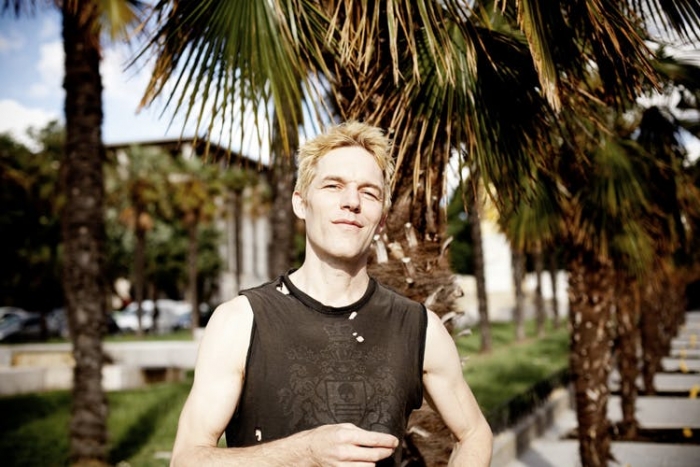
It's crazy that since between my asking the question and your answering it, it was announced Maximum Rocknroll is ceasing making print zines.
Wow! That’s very sad. Losing the tangibility of holding a zine like that versus scrolling on a screen. That’s just sad. The loss of that kind of interactive experience makes me sad. I have kids who have a difficult time comprehending why tangible experience versus on screen experience would be different. Aside from the problems associated with computer/ phone use, the loss of sitting around buried in a magazine, fanzine, record inserts. It’s a presence with you, that’s intimate and lives in the physical realm. Oh, what a bummer that is.
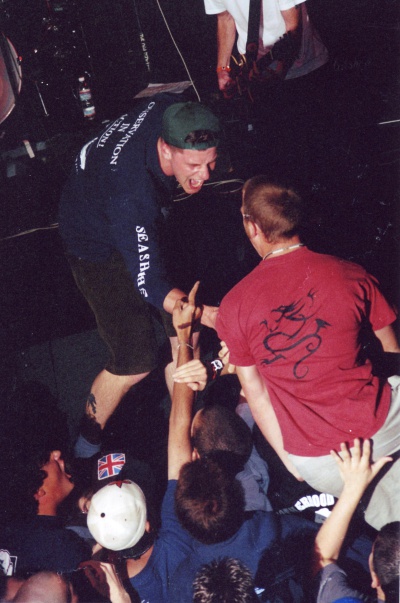
Take us through the demise of Redemption 87 and the rise of the Nerve Agents.
Redemption 87 broke up a few times, which had been an ongoing joke in the scene: “Oh yeah, this their ‘second last show’ or ‘third last show," but finally in 1997, we had our final show and then of course did two 2004 reunion shows, so that was it ultimately. I can’t remember why, but we were just done.
I was gearing up to move to Los Angeles so that I could follow my dream to act, when six months after the Redemption 87 break up I was at a Gilman St show and I became frustrated with what I had been seeing at shows. I went to Andy Granelli from Model American—who constantly harassed me to start a band with him—and I impulsively said, “Are you ready to start that band?” And he was super excited and probably shocked. He and I walked over to Matt Sweirs from the band Rely and got him to join. I went home to this gnarly old band house with a lake in the basement, that I was living in with like six other people, my wife at the time and our two dogs in West Oakland and asked my housemate, Kevin Cross, who had been in a band called Goodfellas, to play guitar, and he was totally down. We decided to play music influenced by earlier hardcore punk bands Bad Brains, Dead Kennedys, Youth of Today, Circle Jerks, etc. The idea was to knock out enough songs to play a show and get going immediately, record a record, and play tons until I moved to LA and then that would be it.
We did all of that. The first show was like two months after we started at Bottom of the Hill in SF. We recorded in May 1998 for a guy named Brett Matthews who was doing Cold Front Records; super nice guy. Paul Miner, who recorded us, apparently played the recording for Jordan Cooper at Revelation Records and next thing you know, I get a call asking if we want to be on Rev. So, for context, that had been my dream since I was a 16-years-old. I was all over it. I had to tell Brett that we needed to move on, he was bummed but understood. Of course, we now had far more exposure and just went forward continuing to play even know I had just moved to Los Angeles. At that point, I just booked us a hell of a lot of shows in Corona and Long Beach, we also had some really great shows at Headline Records. We played Santa Cruz and the Bay Area a ton too, so things just moved at exponential speeds.
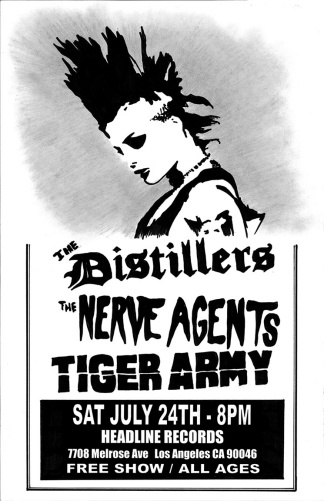
We had a lot of fun those first two years 1998-2000 doing the Nerve Agents. Dante came in to replace Sweirs who quit after the first show, something to do with his girlfriend? That opened the door to bring in Dante who was this incredibly talented and dark kid. His addition to the band really turned our inspirations and conversation towards all of our darker influences (DK, Black Flag, Siouxie and the Banshees, 45 Grave, the Damned, Misfits, the Smiths), which is how the leap from our self-titled record to Days of the White Owl happens. We started wearing eyeliner at that time when we began to notice a very exclusively hardcore kid crowd and some of the punk kids were being made fun of and talked down upon at our shows.
So, we came out on stage with our eye make-up, harkening back to some of our roots and inspirations in the early punk scene, since the Nerve Agents were not just a hardcore band, but also very influenced by earlier punk bands. We were making a statement to our fanbase that were hardcore purists and struggled with diversity in their midst. We wanted everyone there to know that we welcomed everyone hardcore kid, punk kid, whatever. Eventually, that was what our Butterfly Collection album title was about.
A lot shifted when the band parted ways with Kevin and we brought on Zac Hunter and Ryan Mattos started roadieing for us. The whole thing just shifted energetically, as we had solidified a really loyal following in California. At that time, our old friends AFI—who had been there since the beginning—started bringing us on to their shows and many of their fanbase started taking a liking to us. The best part about this time for the Nerve Agents were all of these amazing people we were meeting at our shows and they would be popping up at all of our shows throughout California. Really great people with things to say and artists with amazing artwork, it was just such a rich experience as things just got bigger and bigger. The same thing was happening on the east coast for us too. Just wonderful people and this sense of community everywhere.
When we would play, I always felt so close to those in the crowd. I had a lot of respect for them and I feel like it went both ways. We were there playing the show, they were in the crowd at the show, but mostly it felt like we were all one, just in it together, playing, raging, throwing our crazy energy and emotions around. It was fantastic. Girls, boys, old men and women, little kids it was a really weird love fest most of the time. Despite how angry or serious the music, the lyrics; between songs we were laughing and smiling at one another. I believe because we were all just knowingly, in it together, this brutal world, and we had each other.
Holy smokes. The shift that happened between the EP and Days of the White Owl was noticeable for everyone and I think it was really welcome. The scene down here was starting to put a wedge further between the punk and hardcore scenes and I think for a lot of us it was a breath of fresh air.
[Laughs] Yes, holy smokes!
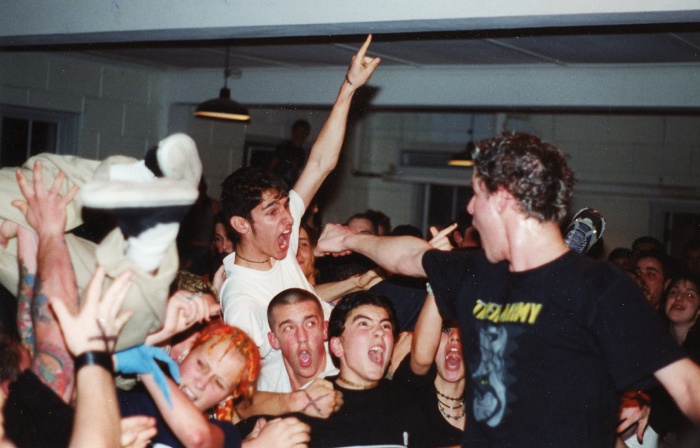
It was this band that was a straightforward hardcore band but now there are these dark elements of Christian Death, Joy Division, 45 Grave, etc., while still having these wild shows that attracted a wide array of underground kids.
I think the Nerve Agents were really just strangely doing what was needed in a time when something new was needed. There was no intention to do anything new, if anything we were doing something that was old, it just had not been done in the particular way that we were doing it. Whatever it was, it worked
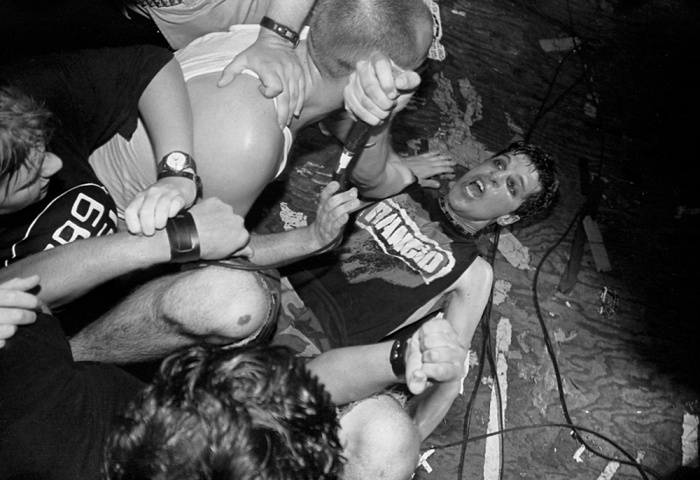
Can we touch on the acting career you alluded to? The only thing I am sure you were in was the television series, Felicity. Was there anything else notable?
[Laughs] There was no acting career. I was an extra for about a week. I was in two episodes of Felicity, amounting to three scenes that I am in. I don’t have any speaking roles. Apparently, because I have never seen it, in one of the scenes they overdubbed a voice saying “excuse me!" [Laughs] They would’ve had to pay me more if that was actually my voice. I was in one scene of Buffy the Vampire Slayer, but you would never know it because I was in the background as a blurry person walking back and forth. I also did some sort of strange commercial that had to do with the holocaust. It was very weird.
When I went to Los Angeles and live there for one year, I hated it so much because it felt so fake to me. I experienced a lot of people who were really seeking to know somebody important. On the Nerve Agents Butterfly Collection album, there’s a song called "Princess Jasmine of Tinseltown" and it gets at the sad insidiousness of LA or Hollywood culture. I learned very quickly, living in LA, that I wanted nothing to do with becoming what I was seeing in others and having to strap on a "kill or be killed" mentality so I could compete for roles and status in general, so I turned my focus and energy into the Nerve Agents and moved back to the Bay Area. I now have a love/hate relationship with that place. Funny, because I never followed through with it, I still have a desire to act.
My lone acting credit comes from a 1995 Tim Armstrong-directed and Patrick Thompson-assistant directed short film called Larry’s Dead, where I play a drunk 49ers fan.
It felt like the Nerve Agents were on the cusp of being the world’s biggest and best punk band when you broke up. I was in Santa Cruz when it happened and we saw you at the bets hall the night before and we heard rumors the SF show at The Pound was going to be your last and it was (but still didn’t go, which I regret to this day). Why go out then when you’re on the way up?
Well, the dynamics between a number of us in the band were getting a bit frayed at that point. Some things were said and some sides were taken and then I quit. My daughter, Grace, had just been born and my focus was on being a very engaged father. It was time for us to move on. Probably best that we went out on a high note. 2001 was a really amazing year of shows for us. We had also had the good fortune to do the "Spirit of the Streets" tour with F-Minus, Agnostic Front, and the Business. When that tour ended, we then picked up with T.S.O.L. We really had a great time with all of those people. Our album on Hellcat Records, The Butterfly Collection, was such a fun and creative experience with the guys in the band. I think that in the end, those three Nerve Agent albums and the Mankind Records split with Kill Your Idols, perfectly encapsulates who we were as a band; The Nerve Agents was straight-up hardcore, Days of the White Owl was hardcore and punk inspirations fuse and go dark, and The Butterfly Collection is the latter, but more creative, experimental, out on a limb for what we were doing.
Looking back on the Nerve Agents, do you have any regrets? Anything you wish you’d done that you hadn’t?
I don’t have any regrets. I wish it did not end the way it did. Dante and I were able to work through those issues, as five years later in 2006, he and I, ironically, started a new band called Said Radio. He and I talked about how what we were doing in Said Radio was somewhat like what we had longed to do next in the Nerve Agents if it had kept going. So, no regrets. I definitely wish we could have done a better last show. Those last few shows in Santa Cruz and San Francisco I had lost my voice completely. That was a bummer. Thankfully, everyone knows the words and had no expectations of me singing into the mic.
I think we had a lot of hope for Said Radio but not much happened.
No, it was hard to put a lot of time and energy into. I was in the middle of raising Grace as a single dad and then working towards my master’s degree in social work. I had always said, if I can’t put 100 percent into the music, i shouldn’t be playing and that’s essentially what happened. We just sort of shut it down slowly over a handful of years. Our last show was at Slims with AFI in 2010. We have three recorded songs that I never put vocals on, so it just sort of faded.
I did really enjoy Said Radio; that was Gary Gutfeld (Redemption 87), Dante Sigona (the Nerve Agents), and Anthony Anzaldo (Ceremony). I would still play with those guys if we had a way to make it work.
Working at Rev, one of the most frequent reunion questions is the Nerve Agents. Let’s publish an answer here. How likely is it?
It’s highly unlikely. Tim Presley is not a fan of reunions. We have talked a lot over the years about this. We came close once, but really, it will never happen. Tim is super busy and very invested in his music with White Fence and DRINKS, and also his art. I support his not wanting to do it. If he ever changed his mind I would be all for it. It would certainly be a lot of fun.
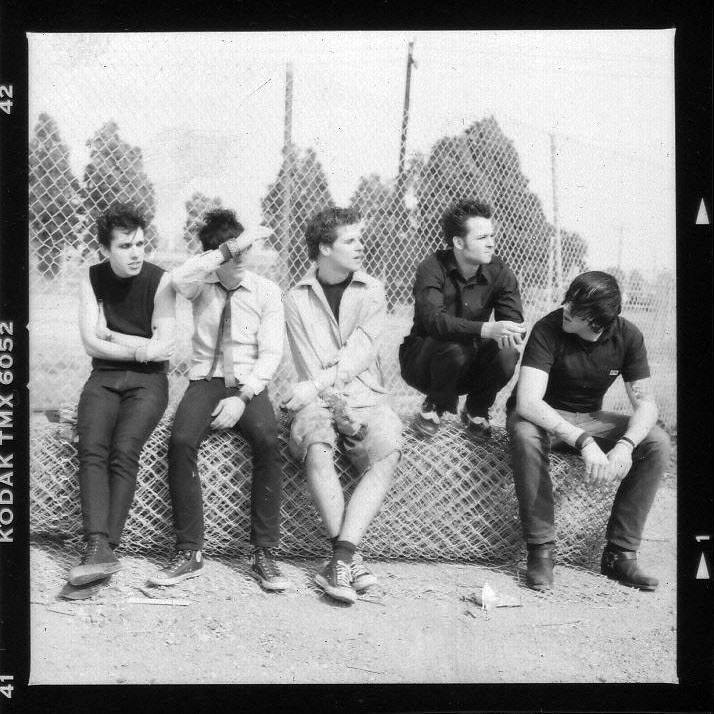
You’re a social worker now. What lessons you learned from punk and hardcore can you apply to the rest of your life?
I have probably learned quite a few lessons. One of the important ones that I recall a lot is the idea, taking a page from the band Bold, that talk is cheap. This idea is relevant every day as I work with people struggling with mental illness and addiction issues. A lot of people come in and want their issues solved, the quick fix, or the magic bullet. There is a lot of change talk that happens with people looking to be free of the issues that they’re struggling with, but little action often follows. This is not everybody, but it is very much a common occurrence. Growing up as a punk/hardcore kid, there was always a lot of complaints about the way things were or are, without a lot of action towards any kinds of solutions. There is a lot of similarity between the two; Social work and the punk and hardcore music scenes, because the common denominator is people in general.
It is important that people recognize that there are issues that need to be addressed but until someone is ready to take action, they are not really ready to be serious about doing the work of solving the problems. Change cannot happen without taking action. Changing ourselves and changing socially is born out of taking action. We can sing about change and talk about doing things different in our lives, but nothing will happen without taking action. This is the reason that I became a social worker, so i could actually act towards change in my life personally and socially. I felt like screaming about everything at people did not do enough towards making change, but that I could do more, and so I did.
Always the concept of breaking down the walls has been an important one for me, obviously that comes from Youth of Today in their album of the same name. Those lyrics run through my head whenever I run up against differences, when they are presented as divisive. As a social worker I work with a diverse range of people and always, I have to be mindful and culturally competent with everyone that I work with if I am to meet them where they are at and help them with whatever needs they may have. I can’t assume from my singular perspective that I have the answers or know what’s best, so I need to look out at other people’s perspectives, getting there requires looking beyond the labels, color of skin, religion, age, identity, etc.
My own personal Unit Pride lyrics to the song "One Will Do" have always stayed with me. I still use that as a social worker, since it’s a pretty thankless job and not a whole lot of long term success with folks, so if I reach just one, then that’s enough to sustain me and fuel to give energy towards the next person. I am hopeful of people.
What helps you get up in the morning? What keeps you going?
First off, I don’t have any reason to not get up or keep going. At this point in my life I have learned to see the beauty in the slowness of life. After I quit the Nerve Agents, raising Grace, my daughter, taught me how to slow down and find joy in the details, in the stillness, and in the richness of people. I am a different person post- Nerve Agents, but I feel like a better one with a wider reach psychologically. So, I wake up and work at being present, finding joy in everything, and try to help others find joy or reduce their suffering. I have interests that are exciting to me; currently I am writing fiction, so I have launched myself into this crazy story that I have imagined. I love the work that I do as a social worker it feels like there is purpose in my life. I enjoy my family very much, they are easily the number one reason that I get up and keep going. I have a lot of reasons to be grateful in my life.
I wanted to wrap it up after that one but tell me about your writing!
Sure. I had always wanted to write and never followed through with it. In October of last year, I started getting this really rich story that was developing in my head, that I really wanted to write. The concepts in the story were so immediate for me. The main character was struggling with issues around trauma, death, and finding joy in her life. I had always wanted to write a ghost story, so that became the foundational piece that these concepts are being laid down upon. It’s really been so much fun and I get to share it with people I love, while at the same time it allows me to work through some of my own issues that are connected to the concepts in the story. The character in the story is struggling with life versus death in very extreme ways, while trying to maneuver symptoms of PTSD.
Writing for me is a return to my creative energy that I have not really accessed since my days in Said Radio. It’s a huge part of who I am and what I have realized is that I need to be actively creative to some degree in my life or else I am letting a piece of me die.
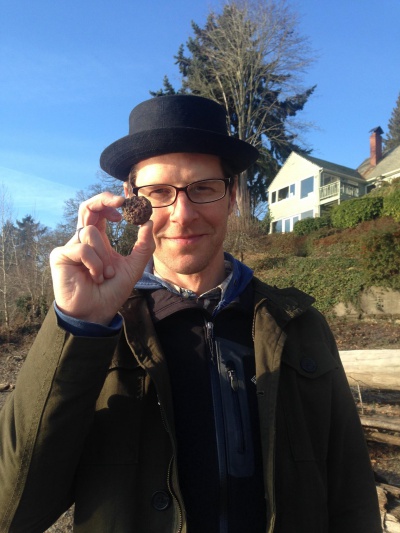
That’s all I got in case you have anything to add.
I don’t think I have anything to add, without sounding crazy [laughs].
Don’t be scared to sound crazy.
OK, my parting comments then. One of the Nerve Agents songs, “Carpe Diem,” was about seizing the day. A lot of my own work for the past 18 years since the Nerve Agents has been about finding joy in each moment as I live a life surrounded by death and its processes. My lyrics were generally filled with encouragement or the attempt to encourage people to think deeper. I had to encourage myself to live a better more fulfilling existence and it has had its rewards. My writing about joy, death, and psychological struggle tends to be the very things I am wrangling with in my own life.
I would really encourage anyone who is open to doing so, to look deeper inside themselves and draw upon strengths that we all have within us (even if you say that you don’t or can’t) and find those strengths to live a richer existence, slow down and be in each moment fully, seeking out the joy in the very details of the moment. Seize it. Everything in your world and those you come into contact with will likely benefit. Rise above the darkness, despite how uncomfortable it feels, hell, change is uncomfortable and scary- so instead of running, fuck it, step up and embrace it. See Adam, I told you I would sound crazy.
That’s not crazy at all. I experience the same thing every day. Anxiety about the future. Regret in the past. It’s a struggle that everyone has, just some more than others.
It is definitely something that most people are experiencing. I feel like, that some people are actually thinking about those things and many are actually trying to escape thinking about those things.
Tagged: redemption 87, the nerve agents, unit pride

